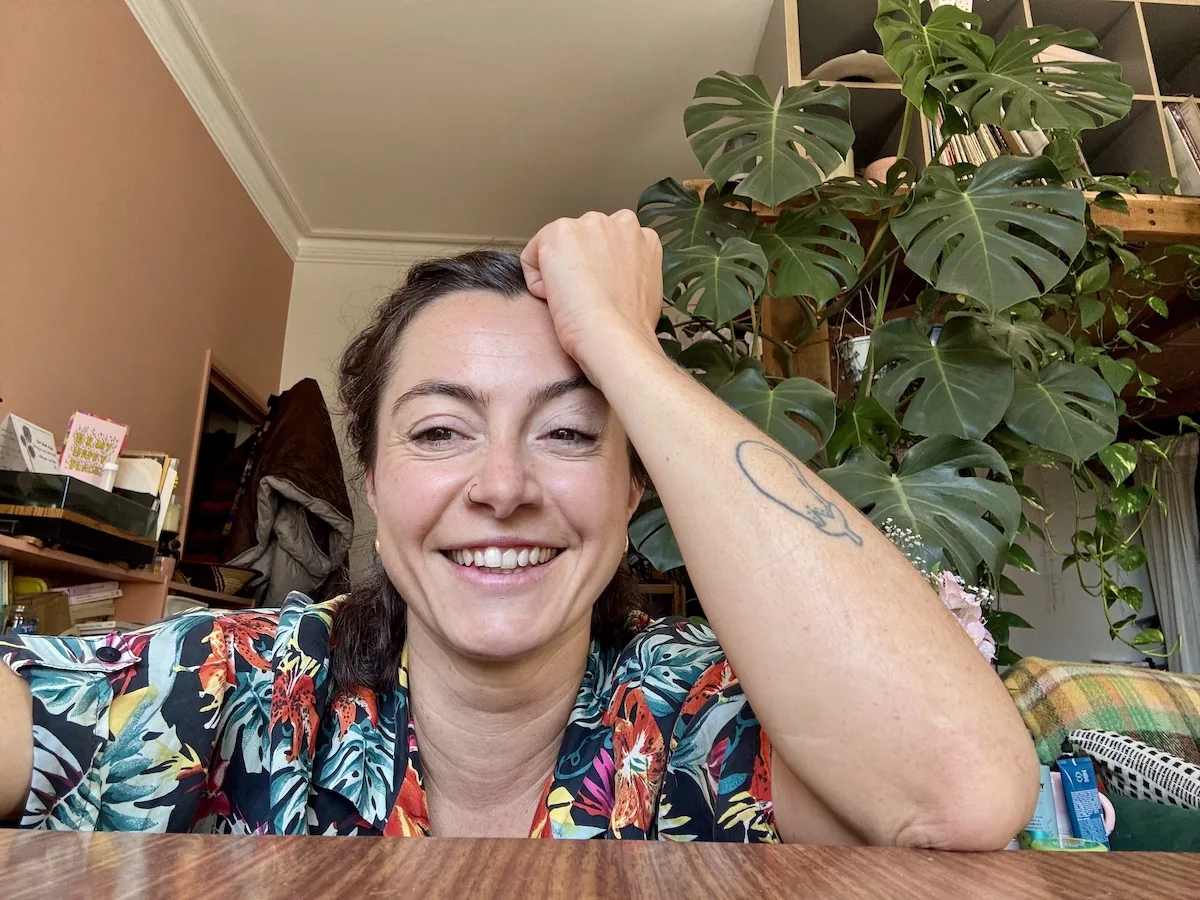How did it take me so long to clock it?! I mean, I’ve got an aubergine tattoo my friend Lily gave me one afternoon because… why not? I once went on holiday for a week and didn’t come home for two months. And the night before my ADHD assessment? I’d just returned from a last-minute road trip to a festival in Wales.
Then there’s the everyday giveaways: overthinking everything, perpetually losing stuff, a severe nicotine addiction, scraping into appointments by the skin of my teeth, and a house full of half-finished creative projects. Add in taking everything way too personally, and… well, you get the picture.
So when the psychiatrist said, “You have combined ADHD,” I was somehow still surprised. Combined ADHD = both the inattentive type and the hyperactive-impulsive flavour of ADHD. For years I thought of myself as inattentive: distracted, dreamy, forgetful. But hyperactive and impulsive? Surely not me. Then I remembered the tattoo. And the two-month holiday. And the festival detour. Oh… right.
And here’s the kicker: I trained as a therapist before being diagnosed. Which is both peak ADHD (who takes up hypnotherapy on a whim?) and quite ironic: how did I, of all people, not see this coming?
The Moment I Connected the Dots
A fellow hypnotherapist first planted the seed when she accidentally mentioned she thought I was neurodivergent (something that I’ll be forever grateful for). At the time, a lot of my friends were going through ADHD assessments, I’d even helped some of them with their forms. The prompts felt uncomfortably familiar, but I brushed it off. “Surely not me.”
When she said it out loud though, I finally gave myself permission to take it seriously. And looking back, so much suddenly made sense:
- Struggling to finish homework or get to class on time.
- Perpetually losing things.
- Craving structure but never quite managing to put it in place.
- Missing lectures at university, pulling all-nighters, forever trying to “catch up” but never quite feeling like I could live up to my potential.
At the time, ADHD wasn’t understood, so… I just assumed I was a failure. I’m not gonna lie, there have been some truly dark and heartbreaking moments along the way.
But it also explained some of the good stuff: the creative solutions, the adventurous streak, the endless curiosity, the many interests. And the risk-taking… like deciding to train as a hypnotherapist.
The Assessment
I took the NHS “Right to Choose” route and waited six months. (Read this blog post for information on how you can do this too.)
The wait was hard. I worried: what if, after all this, they said I didn’t have ADHD? What if I was just lazy? Broken?
The assessment itself was lovely. Dr. Brad put me at ease, and the conversation felt natural. When he told me I had ADHD, I felt relief more than shock. By then, I’d already done much of the grieving and questioning; this was simply confirmation.
Getting diagnosed didn’t magically change everything, but it did feel like someone had handed me the missing piece of a puzzle I’ve been trying to solve for years. And that felt… honestly, kind of amazing ✨
Coping, Without Realising
ADHD brains are amazing. Even without a diagnosis, we instinctively find ways to cope: building systems, routines, and hacks that help us navigate a world not designed for us. Looking back, I can see just how resourceful I’d been without even realising it:
- My colour-coded calendar so I (almost) never miss appointments.
- The many lists to keep track of everything.
- Using a coworking space where I can actually focus.
- Choosing self-employment, which means I can lean into hyperfocus when it comes, and give myself slack when it doesn’t.
- Journalling to navigate my emotions.
And of course, the power of hypnotherapy to pull it all together.
Why Solution Focused Hypnotherapy Helped Me (Even Before I Knew)
Six years of traditional talking therapies had me endlessly unpicking the past. But Solution Focused Hypnotherapy (SFH) did something different. It encouraged me to notice my strengths, to picture the future I wanted, and to build towards it step by step.
Without even knowing I had ADHD, SFH helped me break the cycle of shame and self-criticism. It gave me a sense of acceptance, even appreciation for how my brain works.
It’s no wonder so many of the clients who seek me out are neurodivergent. SFH works with the brain, not against it. It helps reduce the constant stress of navigating a neurotypical world, and it helps people uncover their own tools and strategies for living well.
ADHD as an Advantage?
I believe that we need to shift away from the deficit model of ADHD. Yes, there are challenges. I’ve lived them, and I see them in my clients every day. But when ADHD is harnessed and supported, it can also bring incredible strengths. Creativity, big-picture thinking, energy, curiosity, resilience… ADHD brains often bring so much to the table that’s overlooked when we only focus on what’s “hard.”
Science is beginning to catch up with what many of us have always felt. This summer, I read a fascinating study from the University of Pennsylvania via Thom Hartmann’s article “The Science Finally Catches Up: New Research Confirms ADHD as an Evolutionary Advantage, Not a Disease”. Researchers created a simple online berry-picking game: the bushes would run out, and you had to decide whether to stay or move to a new patch.
Guess who gathered the most berries? People with ADHD traits. 🫐 🍓 🍒
Instead of staying on a patch long after it became almost depleted, ADHDers would cut their losses and move on, making them better foragers. Those same traits that society sometimes labels a disorder – like impulsivity and distractability – would’ve been advantages for our hunter-gatherer ancestors.
Final Thoughts
If you’re reading this and wondering if you might have ADHD: a diagnosis can be life-changing. Not just for the validation (though that matters), but because it opens doors to support, resources, and (for some) medication. For example, did you know about the Access to Work scheme? It provides funding for practical support, like specialist coaching and equipment that make work more accessible.
Different doesn’t mean broken. Different means different. And once you learn to work with your brain instead of against it, you can create a life that feels not just manageable, but exciting, creative, and deeply fulfilling.
If reading my story resonates with you, or if you’re curious about how you can leverage that beautiful ADHD brain of yours, I’d love to meet. Together, we can explore your experiences, talk through strategies, and see how Solution Focused Hypnotherapy could support you.
No pressure. Just a relaxed conversation to help you feel seen, understood, and supported.
Book your free consultation and let’s chat.



